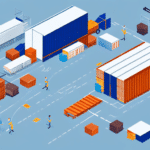Ensuring One-Time Delivery with Quality Logistics Solutions
In an era where e-commerce sales surpassed $5 trillion globally in 2023, logistics has become a pivotal component in ensuring the timely delivery of goods. Selecting a reliable carrier and optimizing the supply chain are essential strategies to prevent stockouts and delays. This article delves into various facets of logistics, emphasizing the significance of quality logistics solutions in achieving one-time delivery.
The Importance of Logistics in Maintaining Delivery Schedules
Logistics is the backbone of timely deliveries, orchestrating the efficient movement of goods from origin to destination. Effective logistics require meticulous planning, coordination, and execution, encompassing transportation, inventory management, and warehousing. According to a Statista report, the global warehousing market is expected to reach $1.2 trillion by 2027, underscoring the critical role of logistics in supply chain management.
Impact on Customer Satisfaction
Timely deliveries are directly linked to customer satisfaction. A survey by Salesforce found that 80% of customers consider the speed of delivery as a key factor in their shopping experience. Delays can lead to dissatisfaction, tarnish a company's reputation, and result in lost business opportunities. Therefore, logistics companies must prioritize customer-centric strategies to enhance loyalty and repeat business.
Leveraging Technology for Enhanced Logistics Efficiency
Advancements in technology have revolutionized the logistics industry, introducing tools that enhance efficiency and reduce costs. From real-time tracking systems to automated warehouses, technology is reshaping how logistics operations are managed.
Advanced Tracking Systems
Modern logistics utilize GPS, RFID, and IoT devices to monitor shipments in real-time. According to a report by IoT For All, IoT integration in logistics has led to a 20% increase in operational efficiency. These technologies provide accurate shipment statuses, enabling proactive management of potential delays.
Automation and AI Applications
Automation through robotics and AI-driven algorithms has optimized warehouse operations and route planning. Machine learning models analyze vast datasets to predict demand patterns and optimize inventory levels. Furthermore, autonomous vehicles and drones are being tested for last-mile delivery, promising faster and more cost-effective solutions.
Effective Supply Chain Management for Optimal Delivery
Streamlining the supply chain is essential for reducing delivery times and enhancing overall efficiency. Effective supply chain management involves optimizing transportation routes, minimizing transit times, and improving inventory practices.
Inventory Management
Proper inventory management ensures that stock levels meet customer demand without overstocking. Utilizing inventory management software and demand forecasting tools can significantly improve accuracy. According to Gartner, companies that implement advanced inventory systems experience a 15% reduction in stockouts.
Route Optimization
Optimizing delivery routes using specialized software considers factors like traffic, weather, and road conditions to minimize transit times and reduce costs. A study by McKinsey indicates that effective route optimization can decrease transportation costs by up to 10% while improving delivery speed.
Choosing Reliable Carriers and Ensuring Quality Control
The selection of carriers plays a crucial role in the safe and timely transport of goods. Evaluating carriers based on their safety records, reliability, and service quality is imperative for maintaining logistics integrity.
Carrier Evaluation
Logistics companies must assess carriers' safety records, fleet maintenance, and driver training programs. Partnering with carriers that have robust safety protocols and high reliability reduces the risk of accidents and delays, ensuring secure transport of goods.
Quality Control Measures
Implementing quality control systems, such as regular audits and compliance checks, ensures that logistics operations adhere to industry standards and regulatory requirements. Utilizing quality management systems can lead to a 25% improvement in operational compliance, as reported by ISO.
Overcoming Challenges in Last-Mile Delivery with Innovative Solutions
Last-mile delivery remains one of the most challenging aspects of logistics, often accounting for over 50% of total delivery costs. Innovative solutions are essential to address issues like traffic congestion, limited access, and high operational costs.
Innovative Delivery Methods
Emerging technologies such as drones, robots, and autonomous vehicles are being utilized to enhance last-mile delivery efficiency. Companies like Amazon and UPS are piloting drone delivery services to expedite the final leg of deliveries, reducing reliance on traditional transportation methods.
Security Solutions
With the rise of package theft, logistics companies are implementing secure delivery options like smart lockers and secure delivery boxes. These solutions require authentication, such as codes or biometric verification, ensuring that packages are safely received by customers.
The Future of Logistics: Trends and Sustainability
The logistics industry is poised for significant transformation, driven by technological advancements and a growing emphasis on sustainability. Adapting to these trends is essential for companies aiming to remain competitive and environmentally responsible.
Technological Advancements
The integration of AI, blockchain, and automation is set to further streamline logistics operations. Blockchain technology, for instance, offers enhanced transparency and security in supply chains, reducing fraud and improving traceability.
Sustainability Practices
As environmental concerns escalate, logistics companies are adopting sustainable practices to reduce their carbon footprint. Strategies include using alternative fuels, optimizing transportation routes for fuel efficiency, and implementing green packaging solutions. According to the United Nations, sustainable logistics can contribute to significant reductions in greenhouse gas emissions.
Conclusion
Logistics plays a critical role in ensuring the timely delivery of goods, directly impacting customer satisfaction and business success. By implementing quality logistics solutions, optimizing supply chains, selecting reliable carriers, and embracing technological innovations, companies can achieve one-time delivery and enhance operational efficiency. Looking ahead, the logistics industry must continue to adapt to technological advancements and sustainability imperatives to remain competitive and meet evolving customer expectations.
Sustainability is becoming increasingly integral to logistics strategies. Companies are exploring ways to minimize their environmental impact through initiatives like utilizing electric vehicles, optimizing delivery routes to reduce fuel consumption, and adopting eco-friendly packaging materials. These efforts not only contribute to environmental preservation but also resonate with environmentally conscious consumers, providing a competitive edge in the market.



















